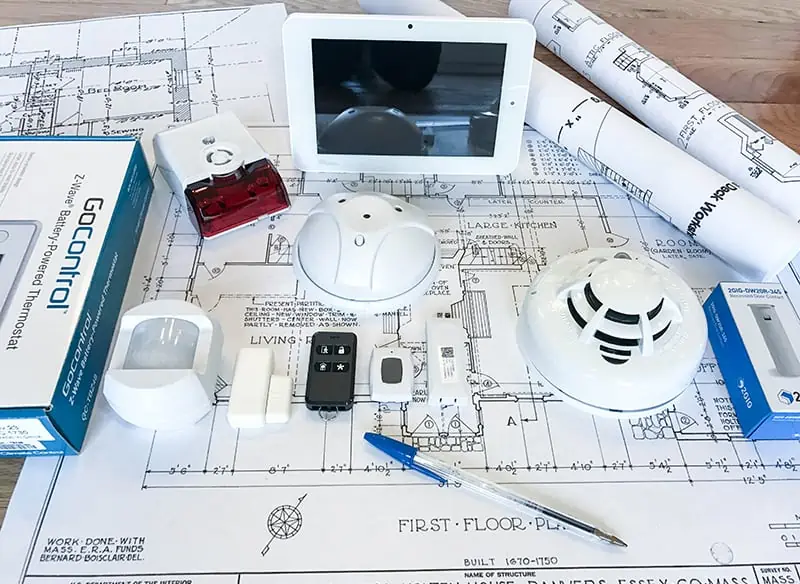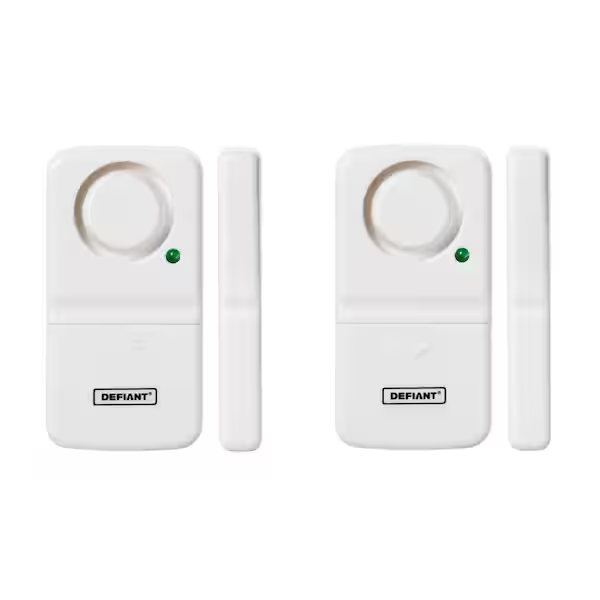
Fortifying Your Sanctuary: A Comprehensive Guide to Modern Home Security
In a world of constant connectivity and evolving challenges, the concept of home as a sanctuary has never been more vital. It’s our private retreat, a place for family, and the guardian of our most cherished possessions. Ensuring its safety is a fundamental aspect of modern living, contributing directly to our peace of mind and overall well-being. The conversation around Home Security has shifted dramatically from simple locks and alarms to sophisticated, interconnected ecosystems. Today, securing your home is not just about reacting to threats; it’s about proactively creating an environment of awareness and deterrence. This comprehensive guide will delve into the layers of modern home security, exploring the technology, strategies, and best practices that can transform your house into a true fortress of comfort and safety, enhancing your Family Life and contributing to positive Mental Health.
The Foundations of a Modern Home Security Strategy
Effective home security is not about a single gadget; it’s about building a comprehensive, layered defense. This principle, long used in physical and cybersecurity, applies perfectly to protecting your home. The goal is to create multiple barriers that deter, detect, and help facilitate a swift response to any potential threat, minimizing risk to both property and person. Understanding these foundational concepts is the first step in making informed decisions for your household’s safety and is a crucial part of responsible Financial Planning.
The Layered Security Approach: Deter, Detect, Respond
A robust security plan operates on three distinct but interconnected layers. Each layer serves a specific purpose, and their combined strength is far greater than the sum of their parts.
- Deterrence (The Outer Layer): This is your first line of defense. The primary objective is to make your home an unattractive target. Visible security cameras, motion-activated floodlights, a well-maintained yard (a key aspect of Gardening Tips and Outdoor Living), and clear signage indicating a security system is in place can persuade a potential intruder to move on before ever attempting a breach.
- Detection (The Middle Layer): If a deterrent fails, the next layer is designed to instantly detect an unauthorized entry. This is the realm of technology. Door and window contact sensors, motion detectors, and glass-break sensors trigger an immediate alert the moment a perimeter is crossed. This is the core of any alarm system.
- Response (The Inner Layer): Once a breach is detected, a swift and effective response is critical. This layer includes loud sirens to disorient an intruder and alert neighbors, instant notifications sent to your smartphone, and, most importantly, a connection to a 24/7 professional monitoring service that can verify the alarm and dispatch emergency services. A personal response plan—focused on safety and evacuation rather than confrontation—is also a vital part of this layer.
DIY vs. Professionally Installed Systems: Choosing Your Path
One of the first major decisions homeowners face is whether to opt for a Do-It-Yourself (DIY) system or a professionally installed one. Each has its merits.
- DIY Systems (e.g., SimpliSafe, Ring Alarm, Abode): These systems offer flexibility and are often more affordable upfront, aligning with smart Budget Tips. They are typically wireless and designed for easy self-installation, making them great DIY Projects. You have control over component selection and placement and can often choose between self-monitoring or optional professional monitoring plans. The downside is that you are responsible for proper installation, maintenance, and troubleshooting.
- Professionally Installed Systems (e.g., ADT, Vivint): These services provide a white-glove experience. A technician assesses your home, recommends a custom setup, and handles the entire installation process. These systems often feature deeper integrations with Smart Home technology and may offer more robust hardware. While the initial cost and monthly monitoring fees are generally higher, they provide peace of mind for those who prefer an expert-managed solution.
A Deep Dive into Smart Security Technology
The engine of modern home security is its technology. Understanding the specifications and capabilities of different components allows you to build a system that is perfectly tailored to your property and lifestyle, whether you live in a dense urban area or a quiet suburban neighborhood. This is where Technology for Home truly shines, offering both security and convenience.

The All-Seeing Eye: Choosing the Right Security Cameras
Video surveillance is the cornerstone of a modern system. It provides visual deterrence, evidence for law enforcement, and the ability to check in on your home from anywhere—a key benefit for those who embrace Remote Work.
- Resolution and Field of View: A camera’s resolution determines clarity. 1080p is the standard minimum, but 2K and 4K cameras offer superior detail, making it easier to identify faces or license plates. The field of view (measured in degrees) dictates how wide of an area the camera can see.
- Night Vision: Most cameras use infrared (IR) LEDs for black-and-white night vision. Higher-end models now offer color night vision, which uses ambient light and advanced sensors to produce a full-color image in low-light conditions, providing significantly more detail.
- Power Source: Options include wired (requires drilling but provides constant power), battery-powered (easy to install but requires recharging), and solar-powered (an Eco-Friendly Living choice that supplements battery life).
- AI-Powered Detection: Modern cameras use artificial intelligence to differentiate between people, animals, vehicles, and packages. This drastically reduces false alarms from swaying trees or passing cars and provides more relevant notifications.
The Unseen Sentinels: Sensors and Alarms
While cameras are the eyes of your system, sensors are the nervous system, detecting physical intrusions with precision.
- Contact Sensors: These simple two-piece devices are placed on doors and windows. When the magnetic connection is broken, the alarm is triggered. They are the backbone of perimeter protection.
- Motion Sensors: These detect movement within a space. Passive Infrared (PIR) sensors detect body heat, while dual-tech sensors add microwave technology to reduce false alarms, making them more reliable for Pet Care by ignoring smaller animals.
- Glass-Break Sensors: These use a microphone to listen for the specific frequency and sound pattern of breaking glass, offering another layer of protection for ground-floor windows and glass doors.
Integrating Security into Your Lifestyle and Community
A truly smart security system does more than just protect against break-ins. It integrates seamlessly into your daily routines, enhancing convenience, family connection, and even your relationship with your community. It’s a tool for holistic home management and a contributor to better Work-Life Balance.
Beyond Burglary: Holistic Home Awareness
The applications of a security system extend far beyond worst-case scenarios. They become part of the fabric of daily life.
- Parenting and Family Life: Video doorbells and smart locks allow you to see when your children get home from school and even let them in remotely. Indoor cameras can help you keep an eye on a sleeping baby or ensure a new babysitter is attentive, offering invaluable peace of mind for parents. These are practical Parenting Tips for the digital age.
- Pet Care: Indoor cameras with two-way audio let you check on your pets while you’re at work, talk to them to ease separation anxiety, and even toss them a treat with certain specialized devices.
- Aging Well: For those caring for elderly parents living independently, discreet sensors and cameras can provide a non-intrusive way to ensure their well-being, sending alerts for unusual inactivity or if a door is left open. This supports independent Senior Living while keeping family connected.
The Smart Home Ecosystem: Automation and Convenience

The true power of a modern system is unlocked when it integrates with other smart devices. This creates automated routines that enhance both security and Home Improvement.
- Example Scenario 1 (Leaving Home): When you arm your system to “Away,” it can automatically trigger a sequence: the smart thermostat adjusts to an energy-saving temperature, all smart locks engage, interior lights turn off, and a few exterior lights turn on for deterrence.
- Example Scenario 2 (Security Event): If a motion sensor on the back patio is triggered at night, the system can instantly turn on all outdoor floodlights, begin recording on all cameras, and announce “You are being recorded” through an outdoor speaker, creating a powerful, automated deterrent.
Privacy, Ethics, and Community Living
With great power comes great responsibility. The use of surveillance technology requires a mindful approach to privacy and neighborly etiquette.
- Camera Placement: Install cameras to monitor your own property. Avoid angling them into neighbors’ windows or private yards. This is a cornerstone of respectful Community Living.
- Data Security: Choose reputable brands that prioritize cybersecurity. Use strong, unique passwords and enable two-factor authentication (2FA) on your security accounts to prevent unauthorized access to your system.
- In-Home Privacy: Consider using cameras with physical privacy shutters or setting “privacy zones” in your app to disable recording in sensitive areas like living rooms or dining rooms when the family is home.
Best Practices and Actionable Recommendations
Technology is only one part of the equation. A proactive mindset and a clear plan are what make a security system truly effective. These practices focus on prevention and safe responses, prioritizing personal safety above all else.

Create Visible Deterrents and a Hardened Perimeter
Don’t hide your security. Make it obvious that your home is protected. Place the security company’s sticker on a visible window and the yard sign near the front walk. Ensure your home’s exterior is well-lit. Simple Home Organization and Decluttering of your yard by trimming bushes and trees eliminates potential hiding spots near windows and doors. Reinforce door frames and install high-quality deadbolts. These small steps in Home Decor and maintenance can have a huge security impact.
Develop a Family Response Plan
The most critical piece of advice from any security professional is to never confront an intruder. Your personal safety is more valuable than any possession. Your response plan should focus on escape and communication.
- Establish a Safe Meeting Point: Designate a neighbor’s house or a specific spot down the street where everyone in the family will meet after evacuating.
- Practice Escape Routes: Just like a fire drill, everyone should know how to get out of the house from different rooms.
- Prioritize Calling for Help: Once you are safely out of the house, call 911 immediately. Let the professional monitoring service and law enforcement handle the situation. This approach is key to Stress Management in a high-stakes scenario.
Conclusion: Investing in Peace of Mind
A modern Home Security system is far more than an alarm; it’s an investment in a lifestyle of confidence and tranquility. By adopting a layered strategy of deterrence, detection, and response, you create a powerful shield around your sanctuary. The integration of Smart Home technology transforms this shield into an intelligent assistant, offering convenience and connection that enriches Family Life. Whether you choose a DIY setup as a personal project or a professionally managed system, the goal remains the same: to leverage technology to protect what matters most. By focusing on proactive prevention and prioritizing personal safety over confrontation, you can build a secure environment that allows you to enjoy your home and live with greater peace of mind.
You may also like
Archives
- January 2026
- December 2025
- November 2025
- October 2025
- September 2025
- August 2025
- January 2024
- October 2023
- September 2023
- August 2023
- July 2023
- June 2023
- May 2023
- April 2023
- March 2023
- February 2023
- January 2023
- December 2022
- November 2022
- October 2022
- September 2022
- August 2022
- June 2022
- May 2022
- April 2022
- March 2022
- January 2022
- December 2021
- November 2021
- October 2021
- August 2021
- November 2020
- July 2020
- May 2020
- April 2020
- March 2020
- August 2018
- July 2018
- June 2018
- April 2018
- March 2018
Categories
- Aftercare Procedures
- Age Groups
- AI/ML
- Alternative Medicine
- Ambient Computing
- Animal Health
- Animal Husbandry
- Animals
- Anti-Aging
- Architectural Design
- Art And Technology
- Auditory Science
- Augmented Reality
- Automation
- Babies
- Baby
- Beauty & Skincare
- Beauty Industry
- Biohacking
- Biomechanics
- Book Reviews
- Breastfeeding
- Budgeting
- Budgeting Strategies
- Business
- Cardiovascular Health
- Career Advice
- Career Development
- Career Growth
- Cats
- Chess
- Chronobeauty
- Circular Economy
- Civic Technology
- Cleaning Tips
- Cloud Computing
- Cognitive Health
- Cognitive Performance
- Cognitive Science
- Community
- Community Building
- Community Engagement
- Community Living
- Computer Vision
- Consumer Guides
- Consumer Trends
- Container Gardening
- Content Analysis
- Content Non-Technical
- Content Strategy
- Cosmetic Chemistry
- Cultural Events
- Cycling
- Data Analysis
- Data Engineering
- Data Science
- Database
- Design Psychology
- Design Trends
- Developer Productivity
- Diet
- Diet
- Digital Identity
- Digital Media
- Digital Wellbeing
- DIY
- DIY Projects
- Dogs
- Engineering Culture
- Entertainment News
- Environmental Impact
- Environmental Science
- Equity Compensation
- Ethical AI
- Exercise
- Exercise Science
- Exercise Technique
- Exotic Pets
- Fall Gardening
- Family
- Family Health
- Family Life
- Fashion Business
- Fashion Industry
- Fashion News
- Fashion Tech
- Financial Analysis
- Financial Optimization
- Financial Planning
- Flooring Maintenance
- Food
- Food Psychology
- Food Safety
- Food Tech
- Functional Fitness
- Functional Training
- Future Of Work
- Garden Care
- Garden Maintenance
- Gardening Tips
- Geospatial Data
- Gig Economy
- Greece
- Greek
- Greek Food
- Green Technology
- Gymnastics
- Hardware Engineering
- Health
- Health And Wellness
- Health Informatics
- Health Science
- Health Tech
- Health Technology
- Healthcare Management
- Healthy Eating
- Healthy Recipes
- Holistic Health
- Holistic Wellness
- Home & Living
- Home Decor
- Home Financing
- Home Health
- Home Improvement
- Home Maintenance
- Home Organization
- Home Styling
- Horticulture
- Household Chemistry
- Identity Management
- Industrial Design
- Industry Analysis
- Infant Nutrition
- Infrastructure Management
- Ingredient Deep Dive
- Integrative Health
- Integrative Medicine
- Interior Design
- Internet of Things
- Internet of Things (IoT)
- Invalid Request
- Investment Strategies
- Investment Strategy
- IoT
- Kids
- Leadership Development
- Learning Strategies
- Lifestyle
- Lifestyle Brands
- Lifestyle News
- Lifestyle Optimization
- Literary Criticism
- Literature
- Logistics Management
- Material Science
- Materials Science
- Meal Planning
- Media Analysis
- Meditation
- Mental Health
- Mental Performance
- Mental Wellness
- Miami
- Miami Food
- Mind And Body
- Minimalism
- Mobile Development
- Neuroscience
- No Applicable Categories
- Nutrition
- Nutrition News
- Open Source
- Operating Systems
- Operational Resilience
- Opinion
- Organization Tips
- Outdoor Living
- Over 40
- Over 50
- Over 60
- Parenting
- Parenting
- Parenting Strategies
- Performance
- Performance Optimization
- Personal Development
- Personal Finance
- Personal Growth
- Personal Productivity
- Pet Care
- Pet Safety
- Philosophy
- Politics
- Product Formulation
- Productivity
- Productivity Engineering
- Protein
- Psychology
- Psychology of Space
- Reading Culture
- Real Estate Investment
- Recipes
- Regulatory Compliance
- Remote Work
- Renovation Planning
- Resource Management
- Respiratory Health
- Responsible Pet Ownership
- Retail Strategy
- Robotics
- Science
- Seafood
- Seasonal Gardening
- Security
- Sedentary Health
- Self-Care
- Skincare Science
- Skincare Trends
- Sleep
- Sleep Health
- Smart Home
- Smoothies
- Social Impact
- Soft Skills
- Soil Health
- Spatial Computing
- Spatial Design
- Stress Management
- Supplements
- Sustainability
- Sustainability Science
- Sustainable Engineering
- Sustainable Fashion
- Systems Engineering
- Tax Optimization
- Tax Strategy
- Tech Investment
- Travel
- Travel News
- Travel Safety
- Travel Tips
- Trend Analysis
- Uncategorized
- Urban Gardening
- Urban Planning
- User Experience
- Veggie
- Vietnam
- Virtual Events
- Volunteering
- Wealth Management
- Wearable Technology
- Wellness
- Wellness Technology
- Winter Gardening
- Work-Life Balance
- Workplace Culture
- Workspace Setup
- World
- Writing
- Writing Skills
- Year In Review
- Yoga
- Yoga News
- Zero Waste




Leave a Reply